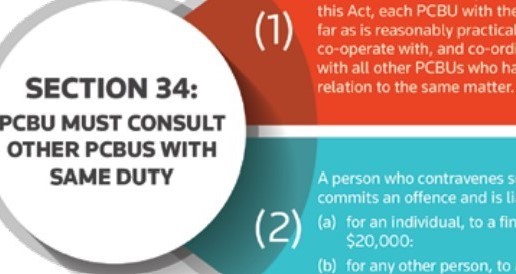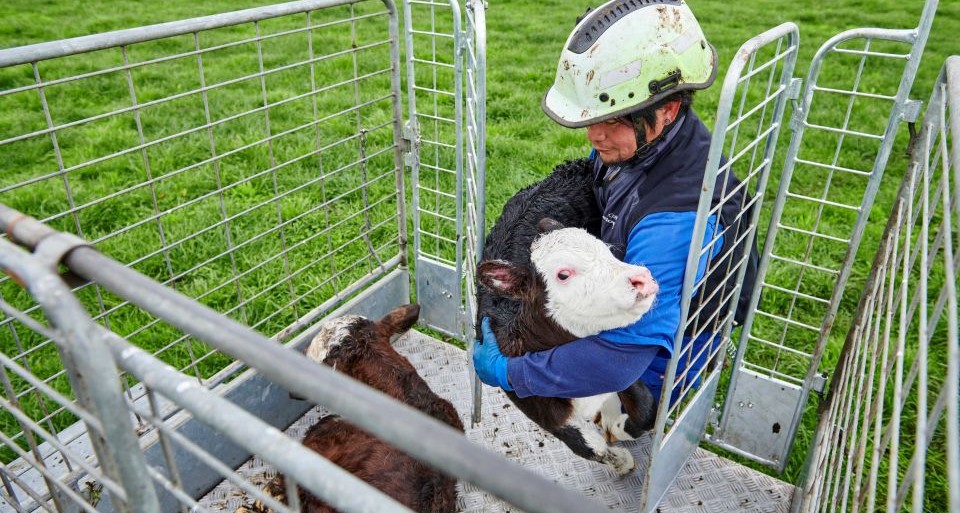Section 34 of the HSW Act sets out the duty to consult, cooperate and coordinate – otherwise known as the ‘3Cs’. In essence, the 3Cs require a PCBU to work with other PCBUs that have overlapping health and safety duties in a coordinated manner.
The 3Cs is still very much a developing area of law. There have only been around 11 sentencing decisions related to convictions under s 34 of HSWA, but the number of sentencing decisions appears to be increasing each year (though there have been none so far in 2024). This may simply be due to the passage of time, as the 3Cs were not a part of H&S legislation until the introduction of HSWA. Of course, it could also be that s 34 captures modern working arrangements where multiple PCBUs are frequently operating within the same workplace, such as on building and other worksites.
In any case, PCBUs should be aware of the 3Cs duty; not only can non-compliance attract significant fines, but a breach of s 34 usually occurs in tandem with other health and safety duties – meaning that the same event can amount to separate HSWA breaches (and fines). This is because the 3Cs duty is not a stand-alone provision. Rather, the duty only arises where a PCBU has a duty under ss 36 – 43 of the Act, and the High Court has recognised that there is naturally some overlap between s 34 and other sections.
The cost of offending
Offending under s 34 may attract a fine of up to $20,000 for an individual, and up to $100,000 for any other PCBU. The courts will consider culpability against the following bands when imposing a fine under s 34:
- Low culpability – up to $15,000.
- Medium culpability – $15,000 to $30,000.
- High culpability – $30,000 to $60,000.
- Very high culpability – $60,000 to $100,000.
The global approach to imposing fines has made identifying developing trends for breaches of the s 34 duties difficult. Of the decisions which have not taken this approach’, the fines imposed to date under s 34 range from $6,000 to $50,000 – which means that we are yet to see offending by a PCBU (other than an individual) that the courts consider at the high end of high culpability, or very high culpability. Interestingly, the average fine awarded is $14,743, which falls within the low culpability band.
Largest fine
As above, the largest fine imposed under s 34 to date is $50,000. This was in the case of WorkSafe New Zealand v McLellan, where a contractor had been engaged to assist with the unloading and storage of stock feed. The contractor had in turn subcontracted two other companies to provide machinery, equipment and staff. Tragically, a worker was killed by a reversing loader when unloading stock feed in a shed operated by the contractor. The sentencing decision, which solely concerned the contractor, followed a finding that it had breached its ss 34, 36 and 48 duties. In relation to s 34, the contractor had failed to consult with other PCBUs; while it had health and safety procedures covering operations where the accident occurred, it had not provided those procedures to the subcontractors.
Park brake and documentation
WorkSafe New Zealand v Fulton Hogan Ltd involves a similar set of facts, although the end fine was $13,500 – markedly less than in McLellan. A contractor had been engaged to remove the old surface of a highway and had subcontracted another company to provide trucking and cartage services. That subcontractor had then informally subcontracted part of its trucking work. Sadly, an employee of the contractor was killed after the park brakes of a truck parked on a downhill incline had failed.
The specific brand of park brakes was widely known both in New Zealand and by the contractor to be defective, and the contractor had removed all of these park brakes from its own vehicles following an unrelated incident that it was not involved in. Unfortunately, the subcontractor’s vehicles still had these park brakes, and an employee of the subcontractor had not parked the truck in accordance with the contractor’s guidance (being that it should have been placed in park or low gear, and its wheels should have been turned towards the kerb). However, the contractor’s extensive safety and work systems documentation was not available to subcontractors, and while the contractor held health and safety meetings with workers, not all workers attended those meetings.
In regard to its 3Cs duty, the contractor had therefore failed to have sufficient processes and monitoring in place to identify all other PCBUs who were operating at the worksite and ensure clear communication of safe systems of work and health and safety expectations.
Labour hire example
In WorkSafe New Zealand Ltd v AWF Ltd, a labour hire company had entered into a contractual agreement for the supply of labour, and an employee had then been placed with another company specialising in manufacturing of materials for commercial and industrial construction. The employee’s hand was injured following an accident with a hot press machine, which was subsequently revealed to be defective. The labour hire company was found to have breached its 3Cs duty, as it had not taken any steps to find out what work the employee would be undertaking or how any health and safety risks would be managed and was fined $13,860.
Mutual responsibilities
The purpose of the 3Cs is to require PCBUs to comply with the primary HSWA duties and to coordinate with other PCBUs about these. The importance of this is highlighted by the sentencing decisions under to date: the other duties and the s 34 duty work hand in glove.
Many of these cases involve PCBUs which have identified risks and have health and safety procedures and expectations to manage those, but have not shared those procedures and expectations with other PCBUs and workers; or PCBUs that have failed to take proactive steps to ensure their workers are operating in safe working conditions when their work is controlled by another PCBU.
It is clear that the duty to consult, cooperate and coordinate not only envisages mutual responsibility where more than one PCBU or individual may have the same duty at the same time, but that PCBUs are expected to be proactive, clear and communicative with one another about the risks and hazards that they have identified.
Consult before deciding
The extent of those duties is also yet to be explored. There are other areas of law, such as employment law and public law, where consultation has been extensively considered. Applying those principles and considering the additional obligations to cooperate and coordinate suggests that the 3Cs are significant.
It is also possible that a PCBU could not complete its primary obligations under s 36 and duty to manage risks under s 30 – and associated Health and Safety at Work (General Risk and Workplace Management) Regulations 2016 – without having complied with the 3Cs. The rationale is that the duty is to consult, cooperate and coordinate rather than dictate a solution. In employment and public law, consultation must precede the decision.
Jim Roberts is a partner and Bridget Perkins a solicitor with Hesketh Henry.




